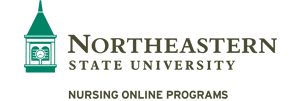Tech-savvy nurses may not balk at changes in health information technology (IT), and in fact, new technologies may even make their jobs easier. But technology can still be intimidating when it lies at the core of doing one’s job well, however.
The field of health informatics is creating a host of new job opportunities for nurses. Undergraduate nursing programs may include health IT content, and RNs may also gain some on-the-job training. But a graduate-level education is required to advance in this field as an informatics nurse specialist (INS).
Northeastern State University (NSU) offers a Master of Science in Nursing (MSN) in Nursing Informatics online that integrates clinical nursing with an emphasis on healthcare technology and data management. RNs can be on their way to a career in nursing informatics in as few as 12 months.
What Is Nursing Informatics?
In 1991, the Institute of Medicine (IOM) — now the National Academy of Medicine — recommended that all physicians integrate computers into their practice by the year 2000 to improve patient care. In 1992, the American Nurses Association recognized nursing informatics as a nursing specialty. Certification is offered through the American Nurses Credentialing Center.
The terms “informatics” and “information systems” are closely related, but they are not the same. Healthcare information systems (HIS) relates to the design, implementation, and maintenance of computer and technology systems that manage data. A degree in nursing informatics prepares RNs with the skills and knowledge to optimize that data for use in the healthcare setting. Common examples of HIS include:
- Electronic Health Records (EHRs)
- Personal Health Records (PHRs), which may be linked to a healthcare organization’s EHR
- Electronic Medical Records (EMRs)
- Electronic Prescribing (e-Prescribing)
The American Nurses Association (ANA) defines nursing informatics as “a field of nursing that incorporates nursing, computer, and information sciences to maintain and develop medical data and systems to support the practice of nursing, and to improve patient care outcomes.” Nurse informaticists typically work in hospitals, with a focus on systems implementation, optimization and training.
What Are Some Benefits of Informatics?
Comparing EHRs with paper charts is one way to understand the value of informatics. Paper charts run the risk of being illegible. They also take up a lot of space, not to mention administrative time. Accessing paper charts is not particularly easy. There is also no way to track who is accessing those records.
For starters, then, nursing informatics specialists help increase efficiencies, create cost savings and protect patient privacy. Informatics specialists help nurses and other healthcare professionals work smarter not harder to improve care and reduce costs. Examples include:
- Increasing the speed and accuracy of nurse documentation
- Streamlining workflow processes, such as admission and discharge
- Ensuring compliance with regulatory requirements
- Improving communication among participating healthcare practitioners to promote care coordination
- Promoting better decision-making to improve patient safety and quality of care
- Reducing medical errors in drug prescribing and dosing
- Identifying areas for improvement, such as through testing and troubleshooting
What Are Some Challenges in Informatics?
Despite widespread use of EHRs and other health IT, there are some challenges. Interoperability is a serious obstacle. In healthcare, interoperability refers to the seamless and secure exchange of electronic health information. Maximizing an EHR’s potential depends on it.
As HealthIT.gov explains, interoperability “improves the delivery of health care by making the right data available at the right time to the right people.” Interoperability represents an area of opportunity for nurse informaticists. In fact, in For the Record, Joyce Sensmeier, MS, RN-BC, CPHIMS, FHIMSS, FAAN calls nurse informaticists interoperability’s “secret weapon.”
A 2017 Nursing Informatics Workforce Survey showed several operational and organization challenges, including:
- Lack of administrative support (21%)
- Lack of staffing resources (13%)
- Organizational strategic plan (12%)
Based on survey results, one thing nurse informaticists do not need to worry about is a lack of necessary technology.
How Can an MSN Prepare RNs for Nursing Informatics?
The Office of the National Coordinator for Health Information Technology Health IT Dashboard shows that as of 2017, 99% of large hospitals had certified health IT. At 97%, medium-sized hospitals are not far behind.
With the growing need for nurse informatics specialists to make the most of those pricey investments, now is the time for RNs to consider an MSN in Nursing Informatics. NSU’s MSN in Nursing Informatics online prepares nurses with both the advanced clinical preparation this career requires as well as current informatics competencies.
Coursework develops specialized knowledge in:
- Aspects and issues of knowledge management and information systems in healthcare settings
- System design life cycle (SDLC)
- Data management, as well as the hardware, software and peripherals used in healthcare settings
- Knowledge and skills to effectively manage change, empower others and influence decision-making
A career in nursing informatics is more than an opportunity to keep up with the latest and greatest advances in technology. It is also a career with a high level of job satisfaction and, based on the HIMSS survey, salaries that can exceed $100,000.
As more hospitals and healthcare organizations strive to meet the triple aim, RNs are likely to see a sustained demand for nurse informatics specialists. RNs with a clinical background and an MSN in Nursing Informatics will be in a strong position to lead healthcare organizations in optimizing the value of their IT investments.
Learn more about NSU’s MSN in Nursing Informatics online program.
Sources:
NCBI: The Computer-Based Patient Record: Revised Edition: An Essential Technology for Health Care
Lippincott Nursing Center: ANI Connection: The Specialty Practice of Nursing Informatics
ANCC: Informatics Nursing Certification (RN-BC)
American Nurse Today: How About a Career in Nursing Informatics?
HealthIT.gov: What Is EHR Interoperability and Why Is It Important?
For the Record: Inside Informatics: Interoperability’s Secret Weapon: Nurse Informaticists
HIMSS: Nursing Informatics Workforce Survey Executive Summary
The Office of the National Coordinator for Health Information Technology: Quick Stats


